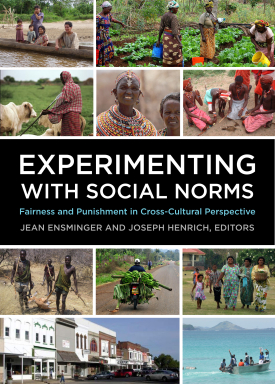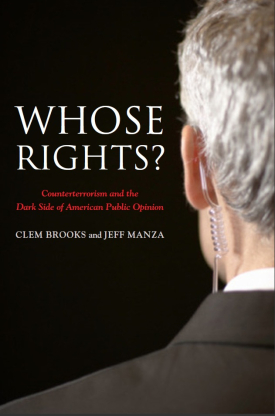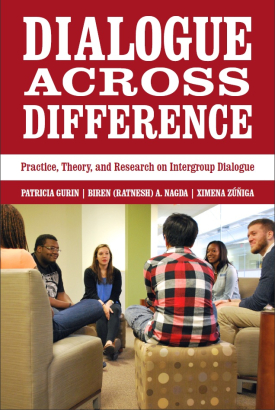African Americans frequently report that police officers are more likely to stop, question and even use force against them than against white suspects. The experience begins rather early. Black youth describe being followed in convenience stores or being pulled over or frisked by police repeatedly. Research on bias in policing has shown that the stereotype that young African American males are more crime-prone oftentimes is accompanied by disparate treatment by the police. But explicit bias, in and by itself, is not always associated with negative or discriminatory police actions.

Experimenting with Social Norms
About This Book
“Experimenting with Social Norms is a valuable summary of fifteen years of important cross-cultural work using methods drawn from experimental economics that places this work in the larger world of behavioral sciences. It is an essential reference for anybody interested in the evolution of cooperation.”
—ROBERT BOYD, Origins Professor, School of Human Evolution and Social Change, Arizona State University
“Experimenting with Social Norms cleverly combines insights from economic experiments and evolutionary approaches to develop cross-cultural foundations for fairness and punishment norms. The treasure trove of information in this volume provides important insights in the role of norms in both small-scale and more complex societies. It will excite the serious scientist and the interested layperson.”
—ERNST FEHR, Professor of Microeconomics and Experimental Economic Research and Chair, Department of Economics, University of Zurich
Questions about the origins of human cooperation have long puzzled and divided scientists. Social norms that foster fair-minded behavior, altruism and collective action undergird the foundations of large-scale human societies, but we know little about how these norms develop or spread, or why the intensity and breadth of human cooperation varies among different populations. What is the connection between social norms that encourage fair dealing and economic growth? How are these social norms related to the emergence of centralized institutions? Informed by a pioneering set of cross-cultural data, Experimenting with Social Norms advances our understanding of the evolution of human cooperation and the expansion of complex societies.
Editors Jean Ensminger and Joseph Henrich present evidence from an exciting collaboration between anthropologists and economists. Using experimental economics games, researchers examined levels of fairness, cooperation, and norms for punishing those who violate expectations of equality across a diverse swath of societies, from hunter-gatherers in Tanzania to a small town in rural Missouri. These experiments tested individuals’ willingness to conduct mutually beneficial transactions with strangers that reap rewards only at the expense of taking a risk on the cooperation of others. The results show a robust relationship between exposure to market economies and social norms that benefit the group over narrow economic self-interest. Levels of fairness and generosity are generally higher among individuals in communities with more integrated markets. Religion also plays a powerful role. Individuals practicing either Islam or Christianity exhibited a stronger sense of fairness, possibly because religions with high moralizing deities, equipped with ample powers to reward and punish, encourage greater prosociality. The size of the settlement also had an impact. People in larger communities were more willing to punish unfairness compared to those in smaller societies. Taken together, the volume supports the hypothesis that social norms evolved over thousands of years to allow strangers in more complex and large settlements to coexist, trade and prosper.
Innovative and ambitious, Experimenting with Social Norms synthesizes an unprecedented analysis of social behavior from an immense range of human societies. The fifteen case studies analyzed in this volume, which include field experiments in Africa, South America, New Guinea, Siberia and the United States, are available for free download on the Foundation’s website.
JEAN ENSMINGER is Edie and Lew Wasserman Professor of Social Sciences at the California Institute of Technology. JOSEPH HENRICH is professor of psychology and economics at the University of British Columbia.
CONTRIBUTORS: Abigail Barr, H. Clark Barrett, Alexander H. Bolyanatz, Juan-Camilo Cardenas, Kathleen Cook, Jean Ensminger, Michael D. Gurven, Edwins Laban Gwako, Kevin J. Haley, Joseph Henrich, Natalie Henrich, Carolyn K. Lesorogol, Frank W. Marlowe, Richard McElreath, Jennifer Morse, Ivo Mueller, David P. Tracer, John P. Ziker
RSF Journal
View Book Series
Sign Up For Our Mailing List
Apply For Funding
In 1988, Dr. Arien Mack of New School University founded the Social Research Conference Series (SRCS) to increase public understanding of critical and contested issues by exploring their broad and historical contexts. Since its inauguration, twenty-nine conferences have covered a variety of innovative topics, including the role of fairness, the political uses and abuses of fear, and the U.S. religious-secular divide – conferences, which have previously been supported by the Russell Sage Foundation.

Whose Rights?
About This Book
In the wake of the September 11 attacks, the U.S. government adopted a series of counterterrorism policies that radically altered the prevailing balance between civil liberties and security. These changes allowed for warrantless domestic surveillance, military commissions at Guantanamo Bay and even extralegal assassinations. Now, more than a decade after 9/11, these sharply contested measures appear poised to become lasting features of American government. What do Americans think about these policies? Where do they draw the line on what the government is allowed to do in the name of fighting terrorism? Drawing from a wealth of survey and experimental data, Whose Rights? explores the underlying sources of public attitudes toward the war on terror in a more detailed and comprehensive manner than has ever been attempted.
In an analysis that deftly deploys the tools of political science and psychology, Whose Rights? addresses a vexing puzzle: Why does the counterterrorism agenda persist even as 9/11 recedes in time and the threat from Al Qaeda wanes? Authors Clem Brooks and Jeff Manza provocatively argue that American opinion, despite traditionally showing strong support for civil liberties, exhibits a “dark side” that tolerates illiberal policies in the face of a threat. Surveillance of American citizens, heightened airport security, the Patriot Act and targeted assassinations enjoy broad support among Americans, and these preferences have remained largely stable over the past decade. There are, however, important variations: Waterboarding and torture receive notably low levels of support, and counterterrorism activities sanctioned by formal legislation, as opposed to covert operations, tend to draw more favor. To better evaluate these trends, Whose Rights? examines the concept of “threat-priming” and finds that getting people to think about the specter of terrorism bolsters anew their willingness to support coercive measures. A series of experimental surveys also yields fascinating insight into the impact of national identity cues. When respondents are primed to think that American citizens would be targeted by harsh counterterrorism policies, support declines significantly. On the other hand, groups such as Muslims, foreigners, and people of Middle Eastern background elicit particularly negative attitudes and increase support for counterterrorism measures. Under the right conditions, Brooks and Manza show, American support for counterterrorism activities can be propelled upward by simple reminders of past terrorism plots and communication about disliked external groups.
Whose Rights? convincingly argues that mass opinion plays a central role in the politics of contemporary counterterrorism policy. With their clarity and compelling evidence, Brooks and Manza offer much-needed insight into the policy responses to the defining conflict of our age and the psychological impact of terrorism.
CLEM BROOKS is professor of sociology at Indiana University, Bloomington.
JEFF MANZA is professor of sociology at New York University.
RSF Journal
View Book Series
Sign Up For Our Mailing List
Apply For Funding

Dialogue Across Difference
About This Book
Due to continuing immigration and increasing racial and ethnic inclusiveness, higher education institutions in the United States are likely to grow ever more diverse in the 21st century. This shift holds both promise and peril: Increased inter-ethnic contact could lead to a more fruitful learning environment that encourages collaboration. On the other hand, social identity and on-campus diversity remain hotly contested issues that often raise intergroup tensions and inhibit discussion. How can we help diverse students learn from each other and gain the competencies they will need in an increasingly multicultural America? Dialogue Across Difference synthesizes three years’ worth of research from an innovative field experiment focused on improving intergroup understanding, relationships and collaboration. The result is a fascinating study of the potential of intergroup dialogue to improve relations across race and gender.
First developed in the late 1980s, intergroup dialogues bring together an equal number of students from two different groups – such as people of color and white people, or women and men – to share their perspectives and learn from each other. To test the possible impact of such courses and to develop a standard of best practice, the authors of Dialogue Across Difference incorporated various theories of social psychology, higher education, communication studies and social work to design and implement a uniform curriculum in nine universities across the country. Unlike most studies on intergroup dialogue, this project employed random assignment to enroll more than 1,450 students in experimental and control groups, including in 26 dialogue courses and control groups on race and gender each. Students admitted to the dialogue courses learned about racial and gender inequalities through readings, role-play activities and personal reflections. The authors tracked students’ progress using a mixed-method approach, including longitudinal surveys, content analyses of student papers, interviews of students, and videotapes of sessions. The results are heartening: Over the course of a term, students who participated in intergroup dialogues developed more insight into how members of other groups perceive the world. They also became more thoughtful about the structural underpinnings of inequality, increased their motivation to bridge differences and intergroup empathy, and placed a greater value on diversity and collaborative action. The authors also note that the effects of such courses were evident on nearly all measures. While students did report an initial increase in negative emotions – a possible indication of the difficulty of openly addressing race and gender – that effect was no longer present a year after the course. Overall, the results are remarkably consistent and point to an optimistic conclusion: intergroup dialogue is more than mere talk. It fosters productive communication about and across differences in the service of greater collaboration for equity and justice.
Ambitious and timely, Dialogue Across Difference presents a persuasive practical, theoretical and empirical account of the benefits of intergroup dialogue. The data and research presented in this volume offer a useful model for improving relations among different groups not just in the college setting but in the United States as well.
PATRICIA GURIN is Nancy Cantor Distinguished University Professor Emerita of Psychology and Women’s Studies at the University of Michigan.
BIREN (RATNESH) A. NAGDA is associate professor of social work and Director of the Intergroup Dialogue, Education & Action (IDEA) Center at University of Washington.
XIMENA ZUNIGA is associate professor of social justice education at University of Massachusetts, Amherst.
RSF Journal
View Book Series
Sign Up For Our Mailing List
Apply For Funding
Recent research suggests that the problem of widespread social conflict in schools – often labeled a "climate" of conflict – is driven by students’ perceptions of collective norms of conflict, which describe the typicality and desirability of behaviors that escalate or condone conflict among students at school. From this perspective, the best strategy for shifting a climate of conflict is not to address students’ personal values or beliefs, but to alter their perceptions of these collective norms.
- April 2018: Supplemental funding of $21,800 granted.
The notable increase in immigration in the U.S. over the past half century, coupled with its recent geographic dispersion into new communities nationwide, has fueled contact between immigrants and the native-born across a wider front than ever before. However, the consequences of contact within this context of ethnic diversity, particularly for key social outcomes such as trust and civic engagement, are far from clear.
Pagination
- Previous page
- Page 26
- Next page
